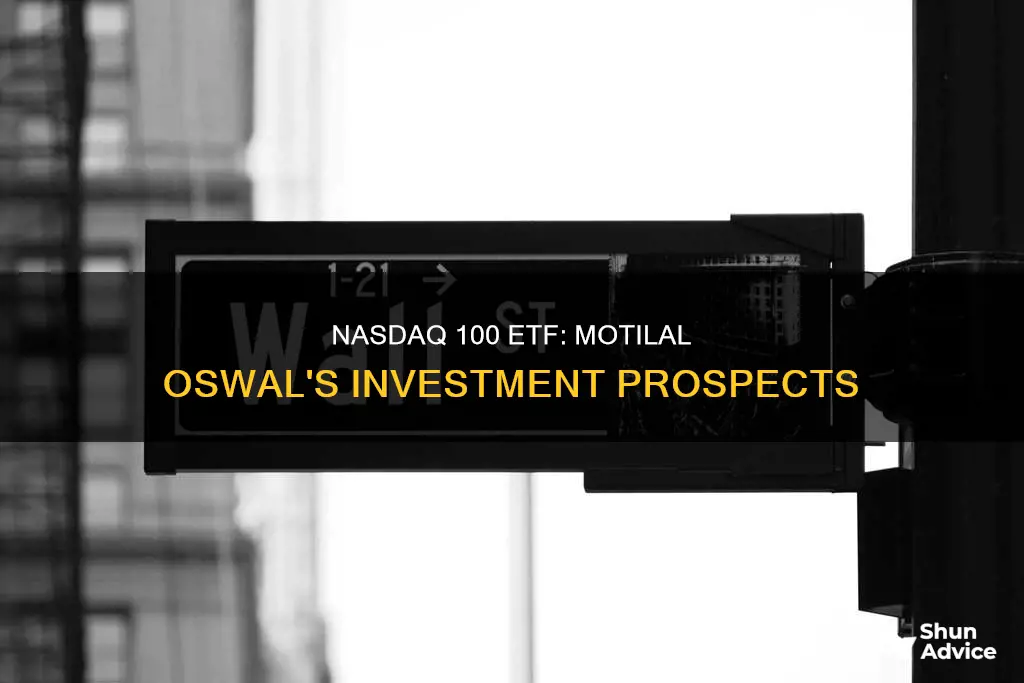
Motilal Oswal NASDAQ 100 ETF is an investment fund that seeks to provide returns that correspond to the performance of the NASDAQ 100 Index. The fund offers both regular and direct options, with the main difference being the commission paid to a broker or distributor. Investors do not need to pay any additional fees to purchase either option, but the expense ratios differ, with regular funds having a higher expense ratio and direct funds having a lower one. The fund has a portfolio of over 100 stocks, with foreign equity holdings making up almost all of its total holdings.
| Characteristics | Values |
|---|---|
| Investment Return | Corresponds to the performance of the NASDAQ 100 Index |
| Investment Risk | Subject to market risks |
| Investment Type | Mutual Fund |
| Fund House | Motilal Oswal Mutual Fund |
| Net Asset Value (NAV) | ₹ 175.5285 |
| Investment Amount | ₹ 8222.53 Cr |
| Expense Ratio | 0.58% |
| Portfolio Turnover Ratio | 13.00% |
| Equity Holding | 0.00% |
| F&O Holdings | 0.00% |
| Foreign Equity Holdings | 99.99% |
What You'll Learn
- Pros and cons of investing in Motilal Oswal Nasdaq 100 ETF
- How does Motilal Oswal Nasdaq 100 ETF compare to other mutual funds?
- What are the fees and charges associated with investing in Motilal Oswal Nasdaq 100 ETF?
- What is the historical performance of Motilal Oswal Nasdaq 100 ETF?
- What are the potential risks of investing in Motilal Oswal Nasdaq 100 ETF?

Pros and cons of investing in Motilal Oswal Nasdaq 100 ETF
Pros of Investing in Motilal Oswal Nasdaq 100 ETF:
The Motilal Oswal NASDAQ 100 ETF offers a range of potential benefits for investors:
- Diversification: Investing in this ETF provides exposure to a diverse range of stocks, with the portfolio aiming to mimic the NASDAQ 100 Index. This index includes some of the world's largest and most innovative companies across various sectors, such as technology, healthcare, and consumer services.
- Convenience: ETFs, in general, offer a convenient way to invest in a basket of stocks with a single transaction. This fund provides an easy way to gain access to the U.S. market, particularly the NASDAQ exchange, without the need to purchase individual stocks.
- Cost-efficiency: ETFs generally have lower expense ratios compared to mutual funds, and this is true for the Motilal Oswal NASDAQ 100 ETF as well. The fund offers both regular and direct options, with the direct option having a lower expense ratio, leading to higher returns for investors.
- Potential for Strong Returns: The NASDAQ 100 Index has historically been associated with strong returns, and the ETF aims to correspond to its performance. The fund has a large-cap bias, investing in well-established companies, which may provide more stable and consistent returns.
Cons of Investing in Motilal Oswal Nasdaq 100 ETF:
There are also potential drawbacks to consider before investing in this ETF:
- Market Risk: Like any investment, there is a risk of negative returns. The performance of the fund is tied to the performance of the NASDAQ 100 Index, so if that index underperforms, the ETF will likely follow suit.
- Concentration Risk: While diversification is a pro, it is important to note that the fund is concentrated in a specific segment of the market. It focuses solely on the NASDAQ 100 Index, so investors are not exposed to other sectors or markets. If the NASDAQ market underperforms relative to other markets, the fund may lag in returns.
- Currency Risk: As the fund invests in U.S. stocks, there is a currency risk associated with the U.S. dollar. Changes in exchange rates between the Indian rupee and the U.S. dollar could impact the value of the investment.
- Limited Control: Investors in an ETF have limited control over the underlying investments. The fund manager makes the decisions regarding the portfolio composition, and investors must trust their expertise and ability to mimic the chosen index.
ETFs: A Collective Investment Scheme? Understanding the Basics
You may want to see also

How does Motilal Oswal Nasdaq 100 ETF compare to other mutual funds?
The Motilal Oswal NASDAQ 100 ETF is an international equity fund that seeks investment returns that correspond to the performance of the NASDAQ 100 Index. The fund has delivered 21.88% returns since its inception 12 years ago and is considered to have a very high risk. It has an expense ratio of 0.58% and no lock-in period. The fund's portfolio is largely conservative, with most holdings in Large Cap stocks and debt instruments.
Compared to other mutual funds, the Motilal Oswal NASDAQ 100 ETF has generated higher returns, with a 23.42% annual return in 70% of cases for investors holding for at least five years. For every unit of risk, the fund produces 20% more returns. It is the oldest international index fund and has doubled investors' money every three years. The fund's expense ratio of 0.24% is close to what most other international index funds charge.
The Motilal Oswal NASDAQ 100 ETF compares favourably to its peers in most aspects. Its returns are currently better than the category average, and it has a conservative investment strategy with most holdings in Large Cap stocks and debt instruments. The fund's performance is more volatile than that of other funds, with a higher standard deviation and beta. However, it offers higher returns for the amount of risk taken, as indicated by its Sharpe and Treynor's ratios.
In summary, the Motilal Oswal NASDAQ 100 ETF offers higher returns and a conservative investment strategy but comes with higher risk and volatility compared to other mutual funds.
A Guide to O Shares ETF: How to Invest
You may want to see also

What are the fees and charges associated with investing in Motilal Oswal Nasdaq 100 ETF?
When considering investing in the Motilal Oswal Nasdaq 100 ETF, it is important to understand the associated fees and charges. Here is an overview of the key expenses to be aware of:
Expense Ratio
The expense ratio for the Motilal Oswal Nasdaq 100 ETF is 0.58%, which is slightly lower than the category average of 0.51%. The expense ratio represents the annual fee that the fund charges investors for managing their money. It is important to note that this fee is typically deducted from the Net Asset Value (NAV) on a daily basis, rather than being paid explicitly by the investor.
Broker/Distributor Commission
The Motilal Oswal Nasdaq 100 ETF offers both Regular and Direct options. The key difference between these options lies in the commission paid to the broker or distributor. With Regular funds, investors pay a higher expense ratio, which includes the commission for the broker or distributor. On the other hand, Direct funds have a lower expense ratio because no additional commission is paid. As a result, Direct funds tend to provide higher returns to investors due to the lower expense ratio.
NAV (Net Asset Value)
The NAV, or unit price, for the Motilal Oswal Nasdaq 100 ETF as of December 3, 2024, was ₹ 175.5285. This value is declared once daily, typically at the end of the day. Based on the NAV, investors are allocated a certain number of units when they invest in the fund. It is important to monitor the NAV as it reflects the performance of the fund and determines the value of your investment.
Risk Considerations
When investing in any mutual fund, it is essential to consider the associated risks. The Motilal Oswal Nasdaq 100 ETF provides a risk meter to help investors assess the potential for negative returns. While a green scale indicates a lower risk of negative returns, a red scale suggests a higher risk. It is recommended to carefully evaluate the risk level associated with the investment before making any decisions.
In conclusion, while investing in the Motilal Oswal Nasdaq 100 ETF, investors should be aware of the expense ratio, broker/distributor commission, NAV, and the associated risks. These factors will influence the overall returns and performance of the investment. It is always advisable to carefully read all scheme-related documents and consult with a financial advisor to make an informed investment decision.
Ally Invest's SPDR ETF Offerings: What You Need to Know
You may want to see also

What is the historical performance of Motilal Oswal Nasdaq 100 ETF?
The historical performance of the Motilal Oswal Nasdaq 100 ETF (MOFN100) is difficult to ascertain due to a lack of historical data. However, as of December 3, 2024, the fund's Net Asset Value (NAV) was ₹ 175.5285, reflecting a 0.26% change from the previous day. The fund size is ₹ 8222.53 Cr, which represents 0.78% of the investment in its category. The expense ratio is 0.58%, lower than the category average of 0.51%.
The fund's portfolio turnover ratio is 13.00%, with the fund manager holding stocks and bonds for longer than peers in the last year. The portfolio consists of 101 stocks, with 99.99% in foreign equity holdings. The top holdings include Costco Wholesale Corporation and Alphabet Inc - Class C.
The fund's standard deviation, beta, and alpha values indicate relatively higher volatility and risk-adjusted returns compared to similar funds. The fund has a 1-year return of 60.38%, according to one source.
Overall, while there is limited historical data available, the Motilal Oswal Nasdaq 100 ETF appears to have had a relatively stable performance with some positive returns and lower fees compared to its category average.
Fertilizer ETF: A Guide to Investing in Agriculture's Future
You may want to see also

What are the potential risks of investing in Motilal Oswal Nasdaq 100 ETF?
As with any investment, there are potential risks involved when investing in the Motilal Oswal Nasdaq 100 ETF. Here are some key potential risks to consider:
Market Risk
Motilal Oswal Nasdaq 100 ETF, like any other mutual fund investment, is subject to market risks. The value of the fund can fluctuate with changes in the market, and there is no guarantee of positive returns. The performance of the fund is linked to the performance of the underlying stocks in the NASDAQ 100 index, which can be volatile.
Foreign Investment Risk
The Motilal Oswal Nasdaq 100 ETF primarily invests in foreign equity holdings, specifically in the stocks listed on the NASDAQ 100 index. Foreign investments carry additional risks, including currency fluctuations, political and economic instability, and different accounting and legal standards. These factors can impact the value of the fund.
Concentration Risk
The ETF is concentrated in a specific segment of the market, focusing solely on the stocks listed on the NASDAQ 100 index. This concentration can increase the fund's vulnerability to adverse events or underperformance in the technology-heavy NASDAQ market. A downturn in the technology sector or a correction in the NASDAQ market could significantly affect the fund's performance.
Liquidity Risk
Liquidity risk exists, particularly if the fund size becomes too large. The fund managers may find it challenging to place money effectively, especially in the mid and small-cap segments. This could impact the fund's ability to meet redemption requests or invest effectively.
Expense Ratio Risk
The Motilal Oswal Nasdaq 100 ETF has an expense ratio, which is the annual fee charged by the fund to manage your investment. While the expense ratio is relatively low at 0.58%, it is still higher than the category average of 0.51%. Higher expense ratios can impact your overall returns, as they are deducted from your investment gains.
It is important to carefully consider these potential risks before investing in the Motilal Oswal Nasdaq 100 ETF. Conduct thorough research, consult reliable sources, and seek professional financial advice to ensure you understand the risks involved and make informed investment decisions.
Invest Wisely: Precious Metals ETF Guide
You may want to see also
Frequently asked questions
Motilal Oswal NASDAQ 100 ETF is a mutual fund that seeks investment returns that correspond to the performance of the NASDAQ 100 Index.
As of December 3, 2024, the fund size of Motilal Oswal NASDAQ 100 ETF is ₹8222.53 Cr, which is 0.78% of the investment in the category.
The expense ratio of Motilal Oswal NASDAQ 100 ETF is 0.58%, which is lower than the category average of 0.51%.
Investing in mutual funds, including Motilal Oswal NASDAQ 100 ETF, is subject to market risks. The level of risk associated with this investment can be assessed by looking at the standard deviation, beta, and other risk-adjusted return metrics.
You can invest in Motilal Oswal NASDAQ 100 ETF online by visiting the Motilal Oswal Mutual Fund website or through Groww, India's No.1 Stock Broker and Trading Platform.







